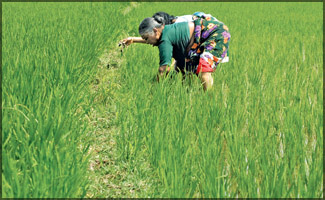Oil crisis: Boon for traditional paddy farming
C. P. KURUPPU
Sri Lanka’s farmers who grow paddy for their home needs are now
discovering a new trend. Instead of the widely-cultivated hybrid
varieties they have opted to grow more traditional varieties of paddy as
the latter are more nutritious, rich in taste, pest-resistant and need
no artificial, petroleum-based fertiliser.
This trend had been there for some time among the home growers but
gathered force with the rise in paddy and rice prices and skyrocketing
prices of chemical fertilisers. Some of these farmers now grow the
traditional varieties for special markets in addition to home
consumption.
Agronomists and environmentalists wonder how so many varieties of
paddy came to exist in a small island like Sri Lanka. Records indicate
that she had about 3,000 different varieties of traditional paddy in
ancient times.
Paddy varieties
|

Cultivating more traditional varieties of paddy |
There are farmers who still have lists of more than 350 different
traditional paddy varieties. Some of these varieties are being stored in
the Agricultural Department’s gene bank for future research work and for
distribution among cultivators who grow them for specific markets.
The origin of rice culture dates back over 5,000 years. Rice is the
second largest produced cereal in the world and the staple food of half
of the world population. The annual world rice production is over 420
million tons and Sri Lanka produces over 2.1 million tons per year. Sri
Lanka’s annual per capita consumption is around 100 kg of rice.
The traditional varieties do not give very high yield per acre but
that drawback is offset by their high nutritional value, pleasant aroma
and the less quantity required for cooking and eating.
They meet the requirements of specific consumers. The traditional
seeds can withstand pests and adverse weather conditions. They grow well
with carbonic fertilizer and can be stored for long periods.
The management responsiveness of these strains of paddy is nearly
30-35 percent more than for the hybrid varieties and the seed cost is
almost 2.5 times less whereas the expected output price is lower for
hybrid rice grain than the actual price for conventional high yielding
varieties.
The cost of the production of hybrid seeds is high, hybrid varieties
require more doses of fertilizer and hybrid seed is not suitable for a
second crop.
Health values
Hybrid seed production involves several technical skills to obtain
acceptable yield level of one to one-and-half tons per hectare.
Sri Lanka’s traditional varieties of paddy are generally identified
by their common name the ‘Uru Wee’ meaning traditional paddy. Different
types of ‘Uru Wee’ have interesting names like Dahanala, Devaraddiri,
Heenati, Hondarawalu, Mawee, Murunagakayam, Patchaiperumal, Suduwee and
Suwandal.
Their growth is from three months to six months. These varieties have
specific qualities of their own. Suwandal is very aromatic,
pachchaiperumal and murungakayam are heavy and kaluheeneti is used for
preparing medicinal porridge.
Farmers who grow traditional varieties of paddy stress the health
values in planting traditional varieties. Tilling and preparations,
transplanting and weeding of the fields give all the exercise humans
need. The seed of most of the traditional varieties are rich in vitamins
and fibre that help to cure stomach ailments.
Environment Minister Patali Champika Ranawaka believes that the days
of using chemical fertiliser are numbered because of its ill effects on
soil and high cost.
Fertiliser
He is very emphatic about the need of using carbonic or natural
fertiliser as alternative to chemical fertilizer in paddy cultivation.
He notes that developed countries which used chemical fertiliser decades
years ago have reverted to environment-friendly carbonic fertiliser.
Most of the consumers in those countries prefer food products free of
chemical applications.
The Minister points out that the paddy yield of the country has not
gone up corresponding to the use of chemical fertiliser.
With oil prices going up almost daily it will not be long before we
will be compelled to give up using chemical fertilizers that are based
on petroleum.
Farmers need to be motivated to grow traditional varieties of paddy
that only need manure and other natural fertilizer.
Carbon manure
Several local administrative bodies like municipal and provincial
councils are making an appreciable effort to encourage residents to
produce carbon manure out of kitchen waste and other material.
Most of the local Government institutions go to the extent of
providing carbonic manure producing containers to the residents at
subsidised prices..
Some NGOs too assist the growers to produce their own carbon
fertiliser. However there is a need for the Government and the public to
be on the alert when it comes to growing traditional varieties of paddy
since Sri Lanka is a country very rich in bio diversity that has
attracted foreigners to the island.
Some of them would be ready to pay any price to acquire the genes of
some of these rare varieties. Hence marketing experts do not rule out
the possibility that at least some NGOs may be engaged in gene theft of
traditional varieties in the guise of helping farmers.
Sometime back such instances were detected and certain local experts
were reportedly found helping foreigners to rob genes endemic to Sri
Lanka. |

